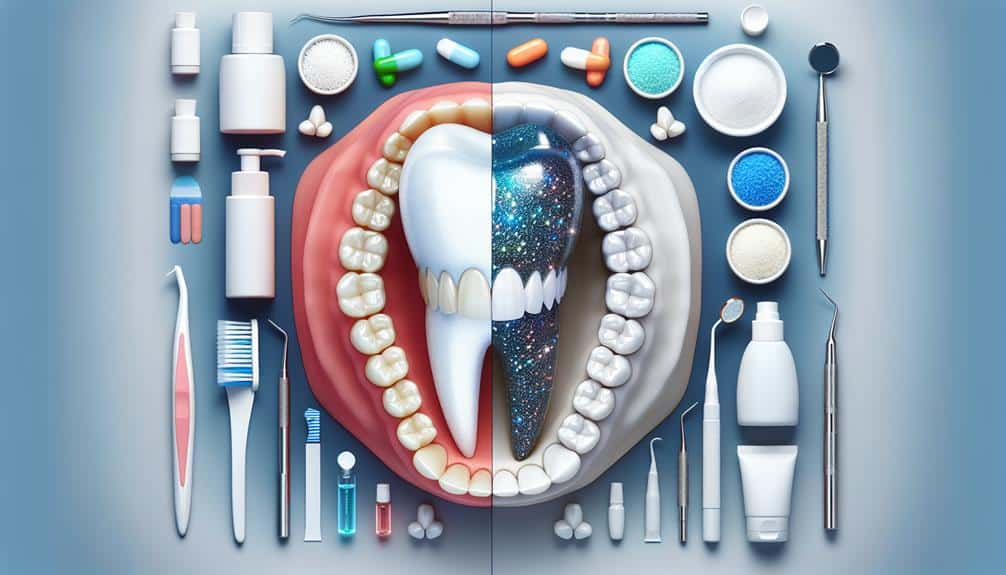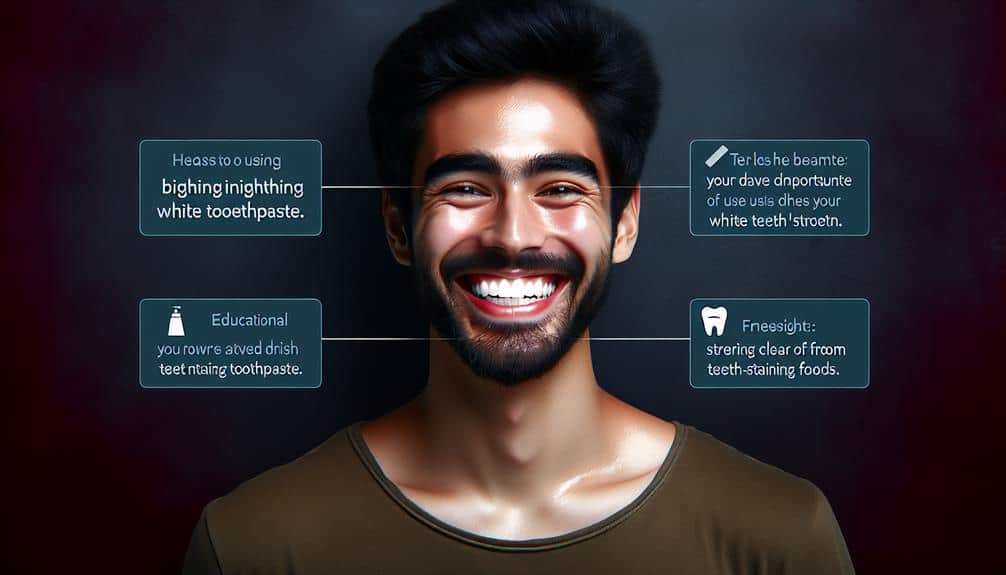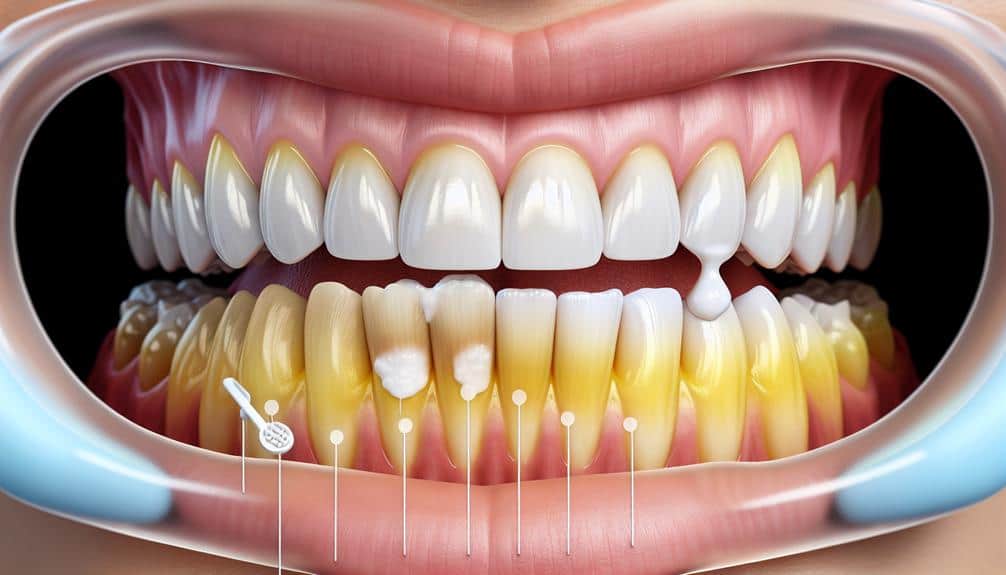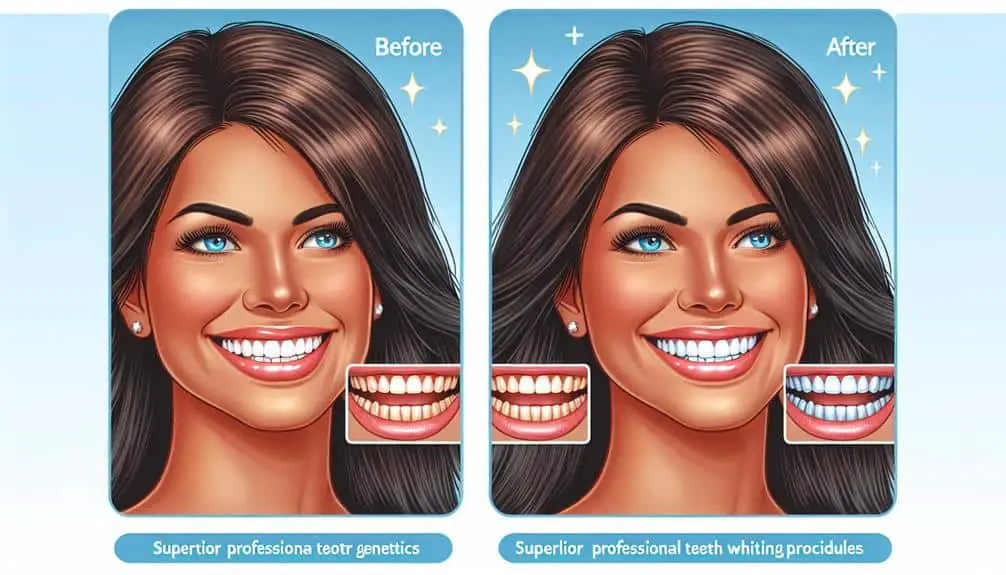To brighten genetic tooth discoloration, professional whitening treatments by cosmetic dentistry experts are your best bet. These procedures use bleaching agents and special lights for effective results. At-home whitening kits with whitening gel and trays offer a practical solution for gradual improvement. Natural remedies like baking soda and coconut oil can also help in reducing discoloration. By combining these approaches, you can enhance the appearance of your teeth considerably.
Key Points
- Professional whitening treatments by cosmetic dentistry experts offer effective brightening solutions.
- At-home whitening kits provide gradual improvement for genetic tooth discoloration.
- Natural remedies like baking soda, hydrogen peroxide, and activated charcoal can help brighten teeth.
- Follow instructions carefully for DIY remedies to avoid tooth sensitivity.
- Dietary adjustments and lifestyle changes can prevent further discoloration and maintain a bright smile.
Understanding Genetic Tooth Discoloration
To understand genetic tooth discoloration, it's essential to explore the underlying causes and mechanisms that contribute to this inherited dental condition. Genetic factors play a significant role in determining the color of your teeth. The enamel structure, an important component of teeth, is influenced by these genetic factors. Enamel is the outermost layer of the tooth and is responsible for protecting it from daily wear and tear.
Genetic variations can affect the thickness and smoothness of enamel, leading to differences in tooth color. Enamel structure plays a key role in how light reflects off the surface of your teeth, ultimately influencing their appearance. Some genetic factors can result in enamel that's more porous or prone to staining, causing teeth to appear discolored.
Understanding the interplay between genetic factors and enamel structure is fundamental in comprehending why some individuals may be more predisposed to genetic tooth discoloration. This knowledge forms the basis for exploring effective solutions to brighten genetically discolored teeth.
Causes of Genetic Tooth Discoloration
Genetic tooth discoloration stems from various factors that influence the color and appearance of your teeth, with enamel structure playing a vital role in determining these characteristics. Genetic factors play a significant role in tooth discoloration, with inherited traits dictating the color and translucency of your enamel. Enamel, the outer layer of your teeth, is composed of various minerals, and any alterations in its structure due to genetic factors can lead to discoloration.
Inherited traits can affect the thickness of enamel, making it more or less translucent, which impacts the visibility of the underlying dentin, the layer beneath the enamel. Additionally, genetic factors can influence the natural color of your dentin, which can show through the enamel, affecting the overall color of your teeth.
Understanding these genetic influences is essential in determining the best course of action to address genetic tooth discoloration effectively. By recognizing these causes, you can make informed decisions about the brightening solutions that will work best for your specific genetic tooth discoloration.
Professional Whitening Treatments
Professional whitening treatments utilize specialized techniques to enhance the brightness and appearance of your teeth, addressing genetic tooth discoloration effectively. In-office procedures offered by cosmetic dentistry professionals are highly effective in combating genetic tooth discoloration. These treatments involve the application of bleaching agents directly on your teeth, which are then activated by special lights or lasers to accelerate the whitening process. The concentration of the bleaching agent used in these procedures is higher than over-the-counter products, guaranteeing faster and more noticeable results.
Cosmetic dentistry professionals tailor the treatment to your specific needs, taking into account the severity of the discoloration and your desired outcome. The controlled environment of a dental office ensures safety and precision during the whitening process, providing you with a brighter smile in a shorter amount of time. Professional whitening treatments are a reliable option for individuals looking to address genetic tooth discoloration with long-lasting results.
At-Home Whitening Kits
Utilize at-home whitening kits as a vital and key-effective solution to brighten your teeth in the comfort of your own space. These kits offer DIY remedies for genetic tooth discoloration, providing an option for home bleaching that can help enhance the appearance of your teeth. At-home whitening kits typically include whitening gel and trays that mold to your teeth, allowing for even application of the whitening solution.
When using at-home whitening kits, it's essential to follow the instructions carefully to achieve best results. Most kits recommend daily use for a specified period to see noticeable changes in tooth color. Notably, excessive use can lead to tooth sensitivity, so moderation is key.
Unlike professional treatments, at-home whitening kits offer the convenience of brightening your teeth on your own schedule and in a familiar environment. While results may vary depending on the severity of discoloration, these kits present a practical option for those seeking a gradual improvement in their smile.
Natural Remedies for Brightening
For a more natural approach to brightening your teeth, consider incorporating these effective home remedies into your dental care routine. Herbal remedies can be beneficial in addressing tooth discoloration. For instance, using a paste made from a mixture of baking soda and hydrogen peroxide can help remove surface stains. Additionally, rubbing a small amount of activated charcoal on your teeth can absorb impurities and lighten stains. DIY solutions like oil pulling with coconut oil may also aid in whitening teeth by reducing bacteria and plaque buildup.
Lifestyle changes and dietary adjustments can play a significant role in maintaining a bright smile. Avoiding foods and beverages that are known to stain teeth, such as coffee, tea, and red wine, can prevent further discoloration. Increasing your intake of crunchy fruits and vegetables like apples and carrots can help naturally clean and whiten teeth. Moreover, staying hydrated by drinking plenty of water can rinse away food particles and reduce the risk of staining. By incorporating these natural remedies and making simple lifestyle changes, you can effectively brighten your teeth and improve your overall dental health.
Frequently Asked Questions
Can Genetic Tooth Discoloration Be Prevented in Future Generations?
To prevent genetic tooth discoloration in future generations, consider implementing prevention strategies early on. Genetic counseling, dental screenings, and maintaining good oral hygiene habits can help identify and address potential issues before they become more severe.
Are There Any Specific Dietary Recommendations to Help Prevent Genetic Tooth Discoloration?
To prevent genetic tooth discoloration, consider dietary restrictions like limiting sugary and acidic foods. Embrace natural remedies such as baking soda for gentle whitening. Lifestyle changes, including regular dental visits, and professional treatments like whitening procedures can also help maintain a bright smile.
How Does Genetic Tooth Discoloration Impact Oral Health Beyond Aesthetics?
Genetic tooth discoloration affects more than just your smile. It can impact your self-esteem and lead to psychological effects. Understanding its broader implications is essential for addressing its influence on your overall well-being.
Are There Any Genetic Tests Available to Determine the Likelihood of Developing Tooth Discoloration?
Genetic testing can determine the likelihood of developing tooth discoloration. Treatment options vary based on results. Consult a dental professional for guidance on managing genetic tooth discoloration effectively. Stay informed to make informed decisions.
Can Genetic Tooth Discoloration Be Reversed Completely, or Is It a Lifelong Condition?
In the world of genetic tooth discoloration, complete reversal remains elusive, often a lifelong companion. Treatment options vary in success rates, with long-term effects and psychological impacts warranting consideration when managing this enduring condition.



